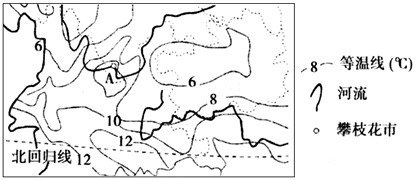下图中A城市位于攀西大裂谷上,冬天胜似春天,被称为四川的“三亚”,它就是攀枝花。这里有富甲天下的矿产资源、浓郁的民族风情,而最有特色的莫过于“冬日三绝”,即内陆同纬度地带最温暖的阳光、生长时间最快的密集鲜花和罕见的温泉。读图,回答下列问题。

(2)图中等温线的大致分布特点是,试分析其原因。
___________________________________________________________________________________________
(3)读图并结合所学地理知识,解释该市拥有“内陆同纬度地带最温暖的阳光”的原因。
___________________________________________________________________________________________
(4)依据材料分析该地温泉的成因。
___________________________________________________________________________________________
(5)请评价当地经济发展的条件。
___________________________________________________________________________________________
(1)10℃~12℃
(2)总体上比较弯曲,自南向北数值递减,局部闭合;纬度因素;地形复杂或多山地、高原,地表崎岖。
(3)该市位于河谷的背风坡,降水少,大气对太阳辐射削弱得少,故阳光充足;冬季风难以进入河谷地区,所以温暖。
(4)该地位于断裂带上,地质条件比较脆弱,地下热水容易出露地表,形成温泉。
(5)有利条件:矿产资源丰富,水能资源丰富,光热资源充足,生物资源丰富,旅游资源丰富。(答对两点即可)不利条件:地处河谷地区(不够开阔),地形复杂,多地质灾害,交通没有东部地区发达(地区的对外开放性较弱)等。
